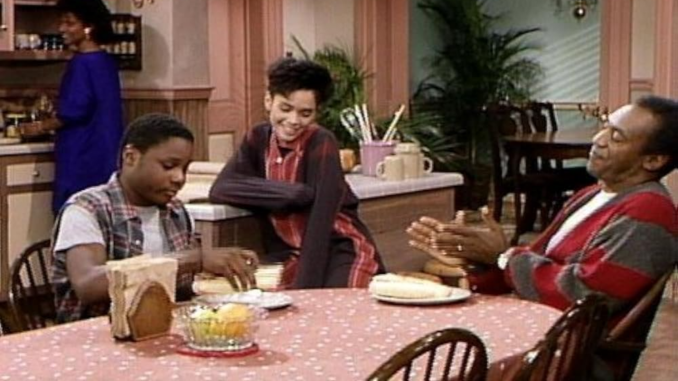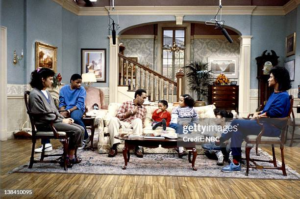
The Heart and Soul of The Cosby Show: A Legacy of Laughter, Love, and Life
When The Cosby Show premiered on NBC in 1984, it wasn’t just another sitcom—it was a groundbreaking cultural event that would reshape the landscape of television. For millions of viewers, it was more than just a weekly comedy; it was a window into the life of a Black family that was complex, loving, and, above all, real. The show brought audiences into the home of Dr. Cliff Huxtable (played by Bill Cosby) and his wife Clair (Phylicia Rashad), along with their children Sondra, Denise, Theo, Vanessa, and Rudy. What set The Cosby Show apart wasn’t just its humor but the way it redefined the narrative surrounding Black families in the media, presenting them as successful, relatable, and full of warmth.
For fans who grew up with the show, the Huxtables became more than just characters on a screen—they became a second family. The love that filled the Huxtable household was palpable, and it wasn’t just about the jokes and the laughter; it was about the moments of vulnerability, the challenges, the triumphs, and the way the family stood together, no matter what. It’s hard to think of a television show that left such an indelible mark on a generation.

The Magic of the Huxtable Family: A Role Model for All
At the heart of The Cosby Show was Dr. Cliff Huxtable, portrayed by Bill Cosby. Cliff wasn’t just a dad—he was the epitome of what so many viewers dreamed of having in a father. He was wise, funny, and always there for his family. His playful banter with his wife, Clair, and the way he handled his children’s challenges made him a role model for fathers everywhere. Cliff Huxtable wasn’t just a character; he became an archetype of fatherhood—approachable, loving, and endlessly supportive. His unique blend of authority and humor set the tone for a show that wasn’t afraid to tackle serious topics while still making people laugh.
But it wasn’t just Cliff who stole hearts—Clair, played by the graceful and talented Phylicia Rashad, was the perfect counterpart to her husband. As a successful lawyer, Clair wasn’t only defined by her career, but by her love and care for her family. She balanced being a mother with a thriving professional life, and the dynamic between her and Cliff was one that offered a healthy, loving view of marriage—showing that respect and equality were the foundation of their partnership.
Then, of course, there were the kids. Sondra, Denise, Theo, Vanessa, and Rudy each brought something special to the show, from Denise’s bohemian spirit to Theo’s relatable struggles with school and self-esteem. Rudy, the youngest of the Huxtable children, won the hearts of audiences with her quick wit and endearing charm. The way the show handled the kids’ coming-of-age stories—complete with all the awkwardness, joy, and challenges that come with growing up—resonated deeply with viewers. They weren’t just caricatures; they were real kids, dealing with real issues, making the Huxtable family one that millions could relate to, even if their own experiences were very different.
A Reflection of the Time: Breaking Barriers in Media
Before The Cosby Show, representations of Black families on television were limited and often one-dimensional. The Huxtables, however, were not depicted as struggling with poverty or living in a “ghetto.” Instead, they were a successful, upwardly mobile family with professional careers, proving that African-American families could be portrayed as prosperous and well-rounded. The show didn’t just give audiences a chance to see Black characters on TV—it allowed viewers of all races to see Black families in a new light, not as an anomaly but as a reflection of American society.
For many African-American viewers, The Cosby Show was revolutionary. It presented an image of Black families that was rarely seen in mainstream media, where Black characters were often relegated to supporting roles or portrayed in negative lights. The Huxtables became an emblem of possibility, a portrayal of a family striving for success, love, and happiness. For many African-American children, seeing the Huxtables on TV made them feel seen, validated, and inspired. The show didn’t just entertain—it instilled hope and pride, providing a platform for stories that had long been underrepresented.
The cultural significance of The Cosby Show was undeniable. Its success proved that there was an audience for diverse stories, and it challenged the Hollywood status quo. The show gave African-American actors, writers, and directors the opportunity to shine in ways that had never before been possible, and it helped pave the way for future generations of Black entertainers and creatives.
The Power of Humor: Lessons in Life and Love
One of the most remarkable things about The Cosby Show was its ability to mix humor with profound life lessons. The show was never preachy, yet each episode subtly offered valuable teachings about relationships, responsibility, and resilience. The humor wasn’t just in the punchlines or Cliff’s antics; it was in the way the family communicated, the way they supported each other, and the way they found joy in everyday life.
The comedy in The Cosby Show was intelligent and clever, often poking fun at the complexities of family life, but it never trivialized the struggles the characters faced. Cliff’s relationship with his children was a highlight of the show, and his fatherly wisdom, paired with Clair’s grounding influence, offered a blueprint for parents everywhere. They didn’t just provide discipline; they provided guidance, helping their children navigate the challenges of growing up with love, patience, and care.
A Legacy That Endures: The Impact of The Cosby Show Today
Even as time has passed since the final episode aired in 1992, The Cosby Show’s impact on television, culture, and society is still felt today. Its legacy has lived on in countless other TV shows and films that have sought to capture the magic of a strong, loving family. And for fans, the memories of the Huxtable family are still fresh, the lessons still valuable, and the love still palpable. The Huxtables became more than just a fictional family; they became part of the fabric of viewers’ lives. They showed us what it meant to love unconditionally, to fight for what you believe in, and to always have each other’s backs.
For those who grew up watching The Cosby Show, it wasn’t just about laughing at the hijinks of the Huxtables—it was about feeling connected to them, seeing them as role models, and feeling as though their home was your home. The show became a safe space where viewers could laugh, learn, and be reminded of the importance of family.
But as time goes on, it’s impossible to ignore the controversies that have surrounded Bill Cosby’s personal life. The allegations against Cosby have overshadowed much of the legacy of the show in recent years, leaving many fans to wrestle with their admiration for the character of Cliff Huxtable in light of the real-life actions of the actor who played him. It’s a complicated issue that has caused deep pain for many fans, who must now reconcile their love for the show with the troubling realities of the actor’s past.
Despite the complicated nature of this legacy, one thing remains clear: The Cosby Show changed television forever. It gave Black families the representation they deserved, offered universal lessons about love and responsibility, and provided countless moments of laughter and joy. The Huxtables are a part of TV history, and no matter what, their place in that history is secure.
Conclusion: A Show That Will Never Be Forgotten
The emotional impact of The Cosby Show cannot be overstated. For many fans, it was a beacon of hope, a reflection of what a loving, strong, and successful family could look like. The Huxtables were a testament to the power of love, the importance of family, and the beauty of everyday life. While we may never forget the lessons they taught us, we also remember the joy they brought to our lives.
In 2024, as we continue to celebrate the legacy of The Cosby Show, we also honor the memories and the feelings it left behind. For fans who grew up with the Huxtables, their story is far from over. It continues to inspire, to teach, and to remind us of the enduring power of family. The Cosby Show will always be a part of our hearts, a timeless reminder that, at the end of the day, family is everything.
